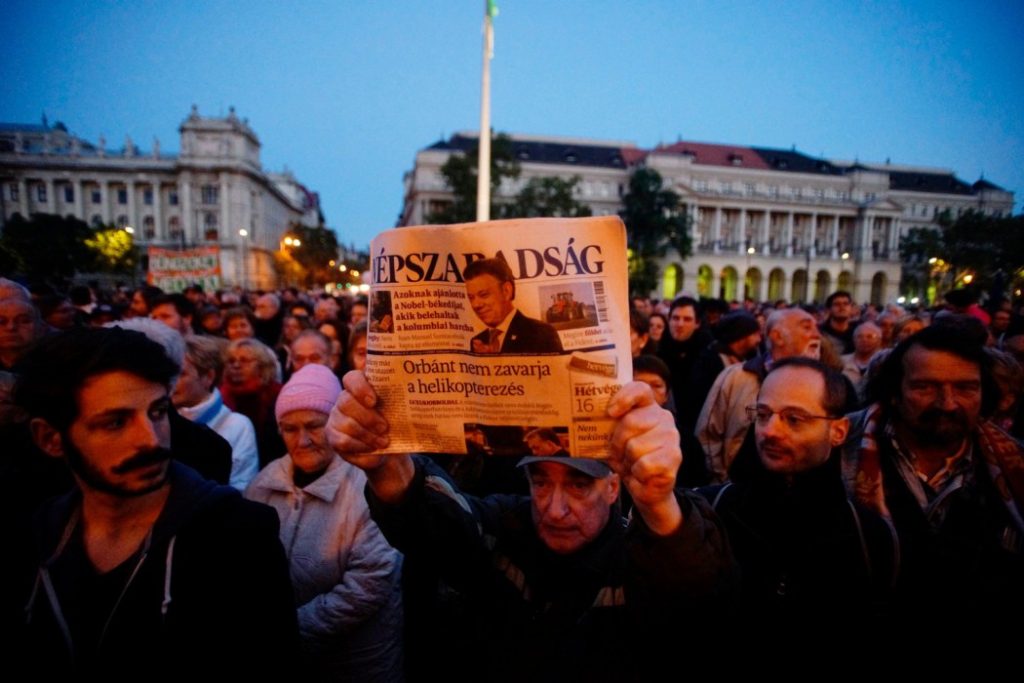Közzétéve: 2016.10.12.
 Az Európai Parlament magyar demokratikus ellenzéki képviselői (Jávor Benedek, Meszerics Tamás, Molnár Csaba, Niedermüller Péter, Szanyi Tibor és Ujhelyi István), együtt levélben fordultak Jean-Claude Junckerhez és Frans Timmermanshoz, az Európai Bizottság első számú vezetőihez a Népszabadság puccszerű bezárása ügyében.
Az Európai Parlament magyar demokratikus ellenzéki képviselői (Jávor Benedek, Meszerics Tamás, Molnár Csaba, Niedermüller Péter, Szanyi Tibor és Ujhelyi István), együtt levélben fordultak Jean-Claude Junckerhez és Frans Timmermanshoz, az Európai Bizottság első számú vezetőihez a Népszabadság puccszerű bezárása ügyében.
A képviselők levelükben azt a kérdést teszik fel az Európai Bizottság vezetőinek, hogy aggodalmuk kifejezésén túl, milyen konkrét lépéseket kívánnak tenni a sajtószabadság védelmében. A levél felveti azt a kérdést is, hogy vajon a legutóbbi események: az eredménytelen népszavazás körüli kommunikáció, valamint a Népszabadság precedens nélküli bezáratása elegendő bizonyítékkal szolgál-e a Bizottság számára a demokrácia sérelme Magyarországon rendszerszintű léptéket öltött és ennek nyomán elindítják-e a jogállamisággal kapcsolatos eljárást a magyar kormánnyal szemben.
A levél eredeti formájában, angol nyelven olvasható alább:
Jean-Claude Juncker
President
Frans Timmermans
Vice-President
European Commission
Brussels, 11th October 2016
Dear President Juncker, and Vice-President Timmermans,
Dear Mr. President and Vice-president,
On the 8th of October 2016, Népszabadság the biggest political daily, was suddenly shut down, thereby proving once more that the state of media freedom and, altogether democracy, is gradually deteriorating in Hungary.
The manner in which it’s shutting down was carried out is unprecedented and highly concerning:
On Saturday the paper’s publisher Mediaworks have suspended the publishing of Népszabadság’s print and online versions until the planned conceptual change of the paper is implemented. The executive director of Mediaworks has resigned on Saturday morning, an acting director was assigned in his place. Employees of Népszabadság were not notified prior to the suspension; instead, they found by Saturday morning that they no longer had access to even their email accounts and to the editorial offices. They received a letter by a messenger service telling them that their employment had been suspended and complemented by a strict confidentiality clause.
The political purpose behind the cessation of the newspaper is beyond question. The speculations about an ownership change in Mediaworks have already reared their heads previously this, suggesting that the change is likely to be politically motivated and that the publisher would become the possession of an oligarch close to Prime Minister Viktor Orbán. Neither the public and the subscribers nor the employees of the paper were informed at any step in the process of the assumed change.
What happened on Saturday is unprecedented and deeply concerning in Europe. An opposition paper, revealing many uncomfortable, controversial and provoking stories and developments regarding government officials, ministers and government-favoured entrepreneurs being shut down with all of its employees suspended, where the entire crew was basically cued by their own publisher is a truly disturbing and alarming development in the state of affairs of Hungarian democracy.
Dear Mr. President and Vice-president,
Last year the Commission raised concerns, albeit claimed no systemic threat with regard to the situation of democracy in Hungary. Despite numerous infringement procedures and the articulated concerns of the Commission, only marginal and minor improvements have so far been implemented while there is a growing democratic deficit in nearly every sector in Hungary. In fact, the current shameless violation against media pluralism now stands as a salient example.
The country now stands after a senseless and invalid referendum spent billions of public money on only to legitimize the anti-migration propaganda of the government, whose asylum-laws, furthermore, the Commission itself assumed to be violating fundamental human rights. The severe damages done to media pluralism have already been outlined in this propaganda in which the public media clearly and unreservedly proved itself to be the underdog of the government.
We are now turning to you with great concern about the state of democracy in our country and would like to inquire: does the Commission see any reason to take action at last with regard to the process of democratization in Hungary at this stage?
We are looking forward to your response.
Yours sincerely,
Benedek Jávor
Tamás Meszerics
Csaba Molnár
Péter Niedermüller
István Ujhelyi
Tibor Szanyi
2016.10.11.